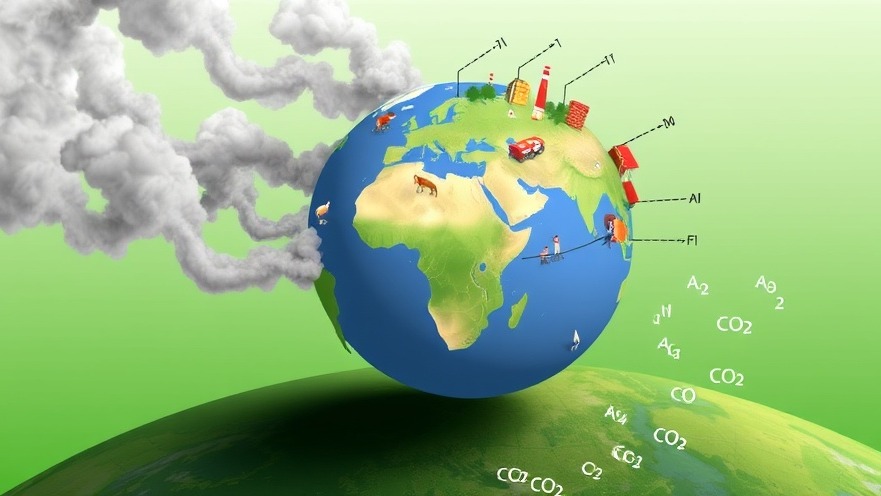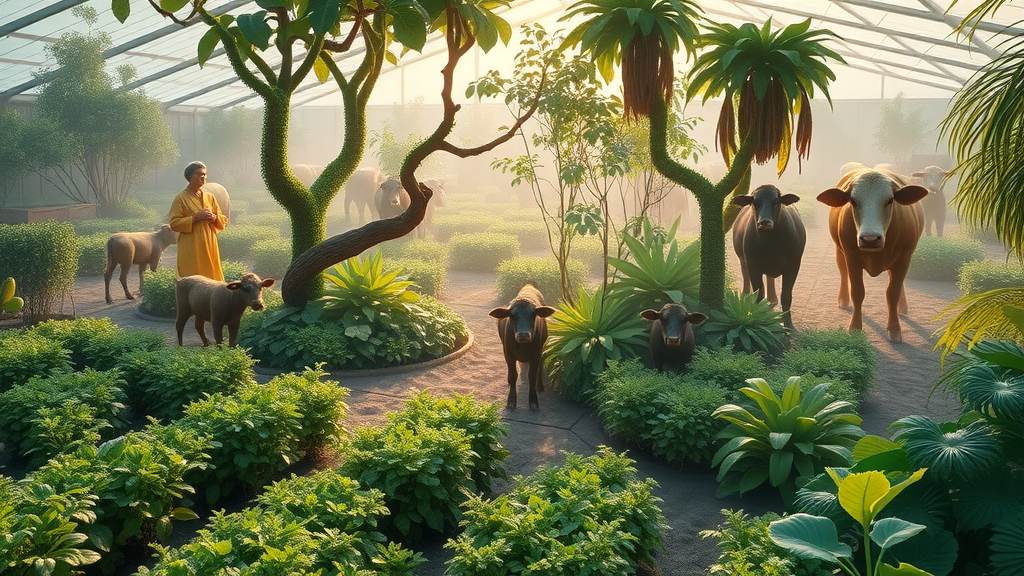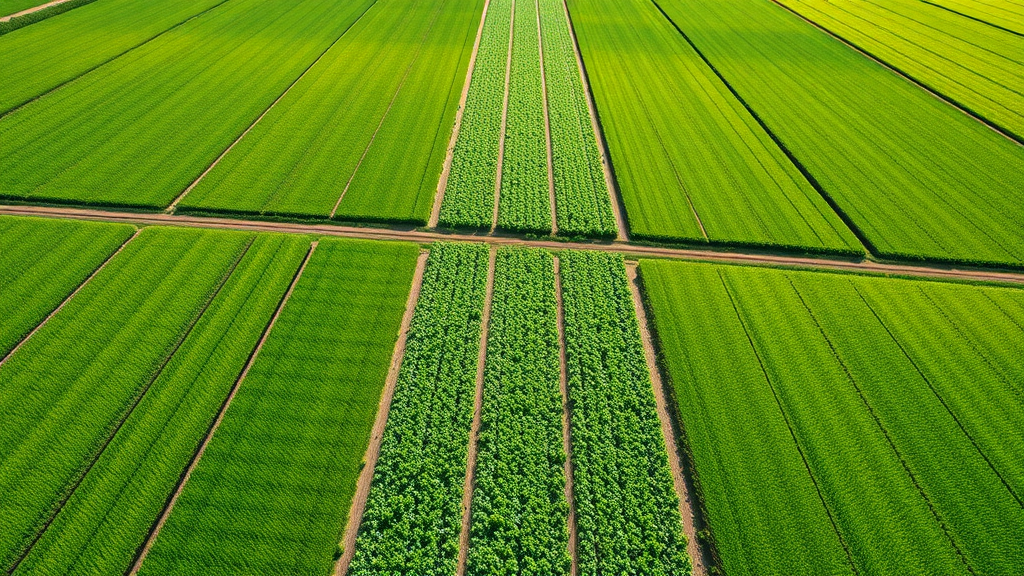The future of sustainability in the food industry depends on cutting emissions, reducing waste, and changing how food is grown, transported, and consumed. Many people assume food is only a small part of the climate problem, but nearly a third of global greenhouse gas emissions are tied to the food system. Real progress will require innovation, smarter production methods, and a shift in both business practices and consumer expectations.

Startling statistic: Up to 30% of global greenhouse gas emissions are linked to our food system.
As the effects of climate change become increasingly undeniable, the food industry stands at a crossroads.
The challenge, though daunting, presents a remarkable opportunity for innovation, efficiency, and sustainability.
In this article, we’ll explore the future of food sustainability , its current challenges, innovative technological advancements, and expert insights that are molding the path forward.
The Hidden Cost of Our Food System

The global food system, while essential to human life, carries a hidden environmental cost.
Intensive agricultural practices, long-distance transport of ingredients, and significant waste generation contribute to a troubling reality.
When you consider that our dietary choices substantially impact both the climate and biodiversity, the urgency for transformation becomes evident.
Overview of the Future of Food Sustainability
Defining Food Sustainability

Food sustainability refers to the comprehensive approach that embeds environmental, economic, and social considerations into our food systems.
It encompasses responsible sourcing, reducing waste, and promoting plant-based diets—all with an eye towards longevity and resilience.
This holistic view not only aims for environmental health but also addresses food security and ethical production practices.
Current Trends in Sustainable Food Practices
In recent years, the food industry has witnessed a shift towards sustainability. The integration of technology, consumer demand for transparent sourcing, and the push for lower carbon footprints are predominant trends.
Organic farming, local sourcing, and plant-based diets are just a few examples of how businesses and consumers can work together to lessen environmental impacts.
Challenges Facing the Food Industry
Barriers to Adoption of Sustainable Practices

Despite the clear benefits, several barriers hinder the adoption of sustainable practices.
These include a lack of awareness and knowledge, inadequate support from executive levels, and the complexity of integrating sustainability into established operations.
Furthermore, the perceptions surrounding sustainability as synonymous with compromise must be challenged to pave the way for acceptance.
The Role of Consumer Demand
The market is increasingly shifting as consumers express a strong preference for sustainability. The demand for sustainable food options is transforming into a competitive edge for businesses.
Educating consumers about the environmental impacts of their choices is critical for driving this demand and subsequently compelling businesses to adopt sustainable practices.
Innovative Solutions for a Sustainable Food Future
Technological Advancements in Food Sustainability
Technological innovations are central to revolutionizing the food industry and enhancing sustainability.
Advancements in data management, resource tracking, and environmental impact assessments help businesses optimize their operations.
For instance, software tools that calculate the carbon footprint of menu items enable restaurants to make informed decisions while maintaining delicious options for customers.
Case Studies: Successful Implementations

Case studies are invaluable in illustrating successful adoption of sustainable practices.
For example, collaborative initiatives with chefs across Europe led to significant reductions in carbon and water footprints. These successes serve as a blueprint for businesses to emulate and inspire broader changes across the industry.
Expert Insights & Best Practices
Quotes from Industry Leaders

Industry leaders emphasize the need for alignment between sustainability goals and culinary excellence. As highlighted by Bruno Sarda, “the food industry must manage its carbon impact while ensuring that food remains affordable and delicious.”
The challenge lies in finding the balance between these essential factors.
Best Practices for Food Businesses
Food businesses can adopt numerous best practices to further sustainability efforts.
Integrating sustainability into procurement processes, leveraging innovative technology solutions, and educating staff about their environmental impact are prime examples.
Moreover, collaboration across supply chains and sharing success stories can amplify the effect of these practices.
The Future of Food Systems
Predictions for 2050

Looking ahead to 2050, a population increase will demand a total shift in how we produce and consume food. Vertical farming, lab-grown meats, and regenerative agricultural practices are likely to become more mainstream.
Innovations in biotechnology will also play a significant role in achieving the necessary sustainability targets.
The Role of Policy and Regulation

Government policies will be crucial in promoting sustainable practices throughout the food industry.
By implementing incentives for sustainable operations, governments can encourage businesses to adopt environmentally friendly practices.
Regulations regarding food waste and emissions will shape how companies approach sustainability in the coming years.
Key Takeaways
Summary of Insights
The future of food sustainability holds promise, but significant challenges remain. By understanding evolving consumer demands, investing in technology, and developing supportive policies, the food industry can lead the way toward a more sustainable future.
Actionable Steps for Readers
Educate yourself and others about food sustainability.
Support local farms and businesses that prioritize sustainable practices.
Advocate for policies that promote sustainability in your community.
Make informed dietary choices that reduce your carbon footprint.
FAQs about the Future of Food Sustainability
What is the future of food sustainability?
The future of food sustainability involves adopting practices that ensure environmental, economic, and social viability within our food systems, including responsible sourcing, waste reduction, and innovations in technology.
How will food change by 2050?
By 2050, we can expect significant transformations in food production, including increased use of vertical farming, lab-grown meats, and advancements in sustainable agriculture that reduce environmental impact.
What are the 7 principles of food sustainability?
The principles of food sustainability generally include: responsible sourcing, reducing waste, supporting local economies, promoting biodiversity, ensuring equitable access to food, emphasizing plant-based diets, and fostering community collaboration.
What is the future of sustainability?
The future of sustainability relies on integrating environmental, economic, and social policies to create systems that support both current and future generations, emphasizing innovation and technology in addressing climate challenges.

Conclusion: The Path Forward for Sustainable Food
Transitioning to a sustainable food system is imperative for our planet's health. By embracing technology, educating consumers, and collaborating across sectors, we can create a resilient and responsible food future.
Call to Action: Stay Informed and Engage with Sustainable Practices
Join the movement towards a sustainable future by learning about food sustainability practices and actively participating in initiatives that promote environmental stewardship within the food industry.
Find more ideas for reducing waste, conserving resources, and supporting eco-friendly practices inside Eco Living, or continue exploring wellness topics across Sacramento Living Well.
---
Prepared by the Sacramento Living Well Editorial Team — published by DSA Digital Media, supporting healthier homes and communities.
 Add Row
Add Row  Add
Add 





Write A Comment